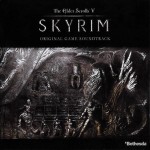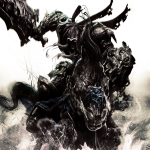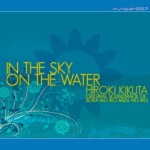Namco Bandai is really good at copying ideas*. Whether it’s Tekken chasing Virtua Fighter’s tail and then giving it a good chomping or Soul Edge teaching SNK’s Samurai Spirits what weapon-based fighting looks like in three dimensions, it’s fair to say that quite a few of Namco Bandai’s hits borrow liberally from other sources. But to be even more fair, ‘is really good at copying’ might as well be ‘improves upon’. Both Tekken and the Soul Series developed a depth not matched by their rivals – in narrative, character development and, of course, music. So when Namco Bandai took a stab at the wildly popular Monster Hunter model, announced Sakamoto Maaya as one of the voice actors and gave the role of scoring to Go Shiina, it was almost a given that God Eater would devour the PSP market whole.
Okay, that was the last ‘eating’ pun. I promise. Because what you really want to read is whether or not Shiina, who hasn’t carried a full-scale soundtrack on his own since Tales of Legendia, is up to the task. No single person has scored a Soul game or a Tekken, and even some of the greatest Final Fantasy soundtracks have had their share of composition delegation.
We analyze just how far one man can push the sonic boundaries after the jump.
My first exposure to Masaru ‘Go’ Shiina was in 2007, when I heard several themes from his excellent Tales of Legendia performed live, and my first impression upon meeting him afterwards was ‘that’s some funky hair’. But I knew by then this soft-spoken newcomer would sooner or later receive the chance to really flex his composing muscles.
Firstly, the theme song: “Over the Clouds” by aLan. Not Shiina’s composition, but I’ve been a fan of aLan since her contribution to the Red Cliff films. Actually, I’m a fan of J-pop game intros in general, so this energetic start worked just fine for me. The same goes for the other ‘vocal tracks’ of the game, but more on them in a bit.
I believe that an equilibrium between distinct style and diverse range is a hallmark of greatness, and Shiina’s introductory track illustrates this perfectly. Take the very best of Legendia’s thematic elements, push them even further with frenetic piano (quite reminiscent of Tekken 5 Dark Ressurection’s “Sunrise”) add heavier percussion and you’re “Tearing up a Storm”. “The Howl of the Wolf” builds on this with punchy brass and background choir, but it’s “A Shadow Covering the Town”, another frantic theme, that foreshadows the game’s most well-known theme, thanks to a pre-release sample on the website.
A mere snippet of “An Approaching Nightmare” sold me on this OST. Two versions feature on the album and, unsurprisingly, they’re both spectacular. The first is primarily acoustic, but it’s the latter to which I keep returning. Despite the ubiquity, I still dig a good chorus, but if you really want to tingle and titillate my hearingbuds (as opposed to tastebuds), mesh voice and machine – and I don’t mean auto-tune, although there are some interesting applications of that on the album too. The carefully-processed chorus of “Nightmare” is something Shiina experimented with on Legendia but here, as child-like chanting in refreshing, powerful triplets fuses with rock and blazing strings, we have something instantly unique and catchy. If facing down Shiva or Kali had a theme, this would be it.
A brief note about “Voice of the Blizzard” – I love, and I mean seriously love, synth panpipe, and I haven’t heard it used this brazenly in a game since a little-known RPG for the SNES called Arcana, a.k.a. Cardmaster (an early composition from Jun Ishikawa and Hirokazu Ando). Love. Muuuch love.
There’s another battle theme I want to highlight, because it really shouldn’t work but still sorta does. That auto-tune I mentioned? Give it some fairly uncreative synth backing, lyrics that probably sound more profound if you don’t understand English and a light choir backing. Call it something bland like “No Way Back –Out of My Way-” and then try to hate yourself as you unconsciously nod your head to the beat despite all logic. Oh, and if the auto-tune is a bit much for you, there’s another version on there with Ben Franklin’s clean voice in a more straightforward rock rendition.
More familiar is the presence of Donna Burke, who has lent her talent to the likes of Final Fantasy Crystal Chronicles, Tales of Legendia and Kanno Yoko’s Turn A Gundam. Here she drives Shiina’s expansion of the short but poignant piano and cello piece “God and Man” to some beautiful heights and tempestuous turmoil with full orchestral accompaniment, reminding us that Shiina also created some of the most moving idolm@ster songs. Again, the lyrics aren’t exactly poetic genius, but Donna’s voice more than compensates.
The scope doesn’t stop at surging battle themes, sweeping thematic developments, rock songs and orchestral ballads, either. Shiina has scored an entire world and it sounds like he explored one to bring it all together. There’s the jazziness of “Adult Time”, the almost 80s electricity of “Fury”, a flamenco-tinged “Flame Dance” and, one of my favorites, the bluesy down-home sway of “A Person’s Warmth”. Another treat is “Ephemeral Wish”, which starts with organ and flute, transitions into piano heard through a crackly radio or phonograph, and then becomes ‘live’ with strings and percussion, and finally brass for a full-bodied crescendo. And I do hope auto-tune doesn’t automatically deter you, because “Enemies of Mankind” and “Table of the Gods” both revel in it, with the latter combining Indian classical undertones, orchestra, synth sampling and tuned female chanting to create a sort of Hindustani electronica dance hymn. Did we mention Shiina likes to blend things?
And just to prove he’s not above more traditional epic choir, Shiina presents “Deo Volente,” which weighs in at a compact two minutes and yet, regarding your typical end-boss theme, has it all in proper proportions. The chorus never dominates, the string melodies never get dull and the soundtrack’s flavor is never compromised or left behind. That Shiina could fit such a stock-standard style ‘big bad’ tune into this ever-surprising album and have it hold its own speaks volumes of his ability to shape not only great tracks but a truly great score overall.
There is also a 17 minute mini-drama which may or may not be of much interest to you, depending on your Japanese proficiency or, as in my case, high-school level Japanese feeding a quietly rabid adoration of Sakamoto Maaya. (Okay, so I lied about the puns.)
In lesser hands, all this genre-hopping would be imbalanced and experimental, mediocrity spiked with moments of goodness. But, as is my habit when I want to make very clear how highly I think of someone, I’m going to place Go Shiina on the same top shelf in terms of one-man (or woman) master-craftsmanship as a few names you might recognize as ‘gods’ of the field: Yasunori Mitsuda, Yuki Kajiura, and yes, Nobuo Uematsu. I’ve missed one particular name, but that’s because I intend to rock the boat a little. We at OSV loved Hamauzu’s Final Fantasy XIII 4-disc behemoth but I personally prefer the God Eater soundtrack, and given that FFXIII had two other prominent composers (with Ryo Yamazaki crafting a good number of my favourite XIII tracks), not even the mighty XIII sits in the same one-man musical tour-de-force category as God Eater. With that statement, I have no choice but to submit that Go Shiina is, by possibly a tiny margin, currently my favorite active RPG composer – not bad for a dude who only has one other RPG under his belt. I won’t hesitate to recommend you hit Play-Asia and grab a copy of this album post-haste.
Dear Namco Bandai: give this man more work already.
______
*But not necessarily as good with blending them: yeah, I’m looking at you, Ehrgeiz.
Tags: Go Shiina, God Eater, Music Reviews, Namco Bandai, Reviews, Videogame









































You actually listened to this album, right?
Hi, D, and yes, absolutely. Quite a few times. It’s playing right now in fact.
As you can probably tell from my review, I kinda like it.
Why, have you actually listened to it too? I’d love to know your opinion on it. Because that’s all I’m presenting here, albeit one slightly informed by my experience in the field of game music and the composers that produce it.
Thanks for commenting, and I look forward to further discussion. 🙂
As soon as I knew Go Shiina was scoring tunes for this game, I was ecstatic!!! I waited patiently till there were sound samples on the site… and whoa… It did NOT disappoint at all. I actually bought the OST without even owning the game (crazy.. I know… Yes I love Shiina that much) just after listening to the 30 second preview of An Approaching Nightmare.
I love how Shiina is experimenting with different styles in this game. One thing to note is that I remember reading in an interview somewhere, that he now experiments with Vocaloid technology as well. I think it’s really interesting to see how he can blend lots of random stuff together and still pull of a masterpiece!
To me, the standout tracks were definitely An Approaching Nightmare (though I felt that the string version told a deeper story *can’t really explain this* rather than the epic disc 2 version), Flame Dance, Voice of a Blizzard, Give Me Power and Tearing Up the Storm. I like the way he uses the orchestra and how he doesn’t hesitate to not make it the sole focus of his song.
And yes, I agree that No Way Back is … addictive… And I have no idea why I like it…
Anyway, the one thing about Shiina that I’ve always liked is that his songs all carry his personality in it. And this OST is no exception. Though he’s using a lot of new instruments and stuff, there’s still something distinctly Shiina in his tracks.
I’d say that this is my favourite OST of all times. And of course, it goes without saying that Shiina is my favourite composer as well. Heck, I even like his Mr Driller tracks.
….sorry for rambling. I love this guy.
Hi kleiorihs, thanks for joining the discussion!
By all means, ramble away. Gush at will. It’s always nice to see a positive response to something we’ve covered. Critical feedback is just as welcome, but sometimes it’s neat to just nod in agreement and say ‘yep, that rocked’.
I don’t have the game either. As a game music reviewer, I often face the decision between listening to the music in its intended context and out-of, but too often I’ve encountered music I just loved in games I didn’t really think deserved such a great score. In the case of God Eater, I became familiar with the development, the style of the game, the focus on characters, watched some videos…that sort of thing. But it’s Go Shiina. I haven’t played Tales of Legendia either, and I still enjoy that OST too. I definitely haven’t played idolm@ster and likely never will, but his ‘Tonari Ni’ is something I never, ever skip (check out Eminence’s live version if you get the chance — it really is amazing).
I certainly detected some Vocaloid influence in God Eater but to me it was the autotuning that stood out. There was a little on the FFXIII soundtrack as well (one of the Chocobo tunes — or was that Vocaloid as well? Hmm…) but here, Shiina wins me over to what I have formerly felt is a cheesy manipulation reserved for RnB songs with grammatically tortured lyrics.
I agree also with your favourite tracks, although the ones I mentioned also rock my socks. Even the less stand-out stuff like what I take to be the fanfare, resting music and town music is well done.
Let’s just hope we see more of Shiina’s work in the future.
Thanks for reading and contributing. 🙂
Thanks for the review! It really made me excited about this soundtrack, because Tales of Legendia is one of my favorite soundtracks ever, really. I just loooove Go Shiina’s musical style. I’ve been waiting for Sheena to release some new material so I’m defnitely getting this.
Hi, Echo, great to hear you’re getting into it. I love Tales of Legendia’s music as well: Ancient Ship, To Deliver the Feelings, The Prayers become Power, Enemy Attack, The Legendary Sorceror…great stuff. But I can confirm: God Eater’s OST is an improvement on all fronts.
Thanks for reading. 🙂